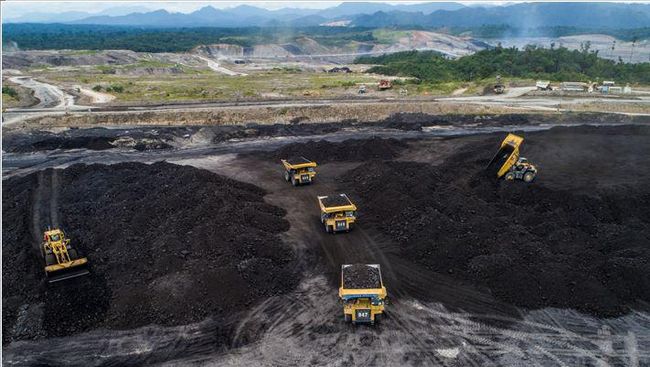Jakarta, CNBC Indonesia – Shares of coal issuers have tumbled in congregation after soaring over the past two years. There are recorded that there are at least 21 listed coal issuers Return negative since the beginning of the year, with the worst losing a fifth of its market capitalization.
The energy sector, which last year had been a support to the JCI movement, has now returned to being a ballast. This sector has experienced the largest contraction, where it has been 9.03% since the beginning of the year. This poor performance also dragged down the JCI, which earlier this year was listed as one of the world’s most depressed stock exchanges.
The poor performance of coal inventories is in line with the collapse in the price of global benchmark ICE Newcastle coal which since the close of trading on the last day of last year, the price has fallen by 5.42%. In the space of a month, the price of coal weakened by 8.32% and since hitting an all-time high in early September, it has fallen by 21%.
Overall, 21 coal issuers that weakened earlier this year contributed to the loss of IDR 81.19 trillion in the market capitalization of the national stock exchange. Adaro Energy Indonesia (ADRO) is the issuer with the greatest weakening, both in terms of percentage and amount of canceled capitalization. Since the start of the year, shares of the Garibaldi-owned broadcaster ‘Boy’ Thohir have plunged 21.30% with the company’s market capitalization dropping to Rp26.23 trillion.
ADRO shares have started to enter a downward trajectory since the end of the trade in which its name will be registered as a dividend payee or cum date last December 30th. Since then the company’s stock has moved almost exclusively in the red zone.
Then there are also the shares of Indonesia’s richest tycoon, Bayan Resources (BYAN), which, although it has lost only 3.21% since the beginning of the year, contributed to a loss of IDR 22.50 trillion market capitalization.
ADRO and BYAN were included in the ranks of the four stocks that weighed the most on the JCI earlier this year (latecomer), with two others, Bank Rakyat Indonesia (BBRI) and Astra International (ASII).
Stocks of major Indonesian coal issuers that have also experienced notable weakness this year include Bumi Resources (BUMI), Bukit Asam (PTBA), Indo Tambangraya Megah (ITMG) and United Tractors (UNTR).
This weakening occurred as investors began to pace themselves and anticipate falling commodity prices that they feared would hurt the company’s revenue and earnings performance. On top of that, improved diplomatic ties between China and Australia appear to have added to investors’ jitters. This year, China lifted a ban on illegal imports of Australian coal that came into effect in late 2020.
However, reports from several media outlets and analysis by the CNBC Indonesia Research Team said the impact was relatively small given the relatively different profiles of Australian and Indonesian coal exports.
Last year, a number of Indonesian coal issuers performed strongly due to soaring coal prices. In the last four quarters for which financial reports are available, the total profit of Indonesian coal emitters has increased by up to 300%. Currently, shares of coal issuers are also trading at relatively cheap prices with low PER and PBV valuation ratios. However, the valuation ratio could rise this year if coal prices fall again and suppress the company’s earnings performance.
The poor performance of coal stocks – and the energy sector more broadly – eventually became the main drag and beat the national benchmark. Since the beginning of the year, the JCI has weakened by 2.37% and is one of the worst in the world and is only better than the record performance of the Chilean and Turkish stock exchanges. Meanwhile, most of the other global stock exchanges started the year in cheerful conditions with positive record performances.
CNBC INDONESIA RESEARCH TEAM
Next article
Market Focus: US Inflation High, JCI Falls into Red Zone
(FSD)


:quality(75)/cloudfront-us-east-1.images.arcpublishing.com/elcomercio/GIYDCNZNGAYS2MBVKQYDAORSGA.jpg)